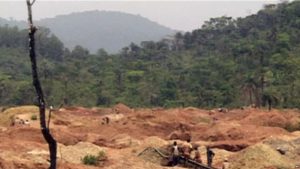Better known for its diamond fields, gold exploration and mining in Sierra Leone is on the increase. The British company, Cluff Gold, has announced it will build a mechanized gold mine in the southern Kangari hills after finding large deposits of gold in the rock. Several hundred local miners also pan for gold in the area.
Bobo Simbo stands thigh-high in a pool of orange water, sifting the mud for traces of gold dust. He swirls the tin pan and a tiny amount of gold glints in the sunlight. He spits in the pan and swirls again, gathering the precious dust in a small depression in the pan.
Simbo has been mining here for the past two years. He is one of many who have flocked to the Kangari hills in southern Sierra Leone to find small fortunes in the hard graft of alluvial gold mining.
He makes enough money from the sale of gold dust to take care of his wife and three children. Simbo says the guarantee of a daily profit makes the back-breaking work worthwhile.
Simbo says if he works hard, he can get two or three carats of gold every day. He says, within a week that adds up to a nice sum.
Simbo says he can make up to $100 a week, an impressive take-home in one of the poorest countries in the world.
In the past few years, Baomahun town has mushroomed as people rush to mine the land before it is taken over by the British mining company, Cluff Gold, whose 137 kilometer concession includes the artisanal mining pits.
Local miners like Simbo do not pay leases for the land or mining royalties. They are small-scale workers, digging in surface pits which have already been mined. Even so, many rely on panning for gold to survive.
Baomahun’s chief, Joseph Kowa, says artisanal gold mining has transformed the town.
Kowa says the local mining is responsible for the town’s rapid population increase. He says, because diamond mining in Kono, Kailahun and Tongo districts is slowing down, people are turning from diamonds to gold.
Kowa says, unlike many jobs in Sierra Leone, the profits to be had from artisanal gold mining are steady. He says, at the end of the day, you are sure to make at least three or four dollars, to sustain your family.
Gold is also fueling the local economy. At the central market in Baomahun, business is booming. Women sit with vegetables, fruits and dried fish heaped in high piles. Cluff Gold built the market when they began exploring for gold here in 2005.
The Baomahun license area is estimated to hold up to two million ounces of gold. But it is not easy to get at. Specks of gold embedded in the mountain rock can only be extracted by blasting and crushing the rock to powder.
Senior Administrator for Cluff Gold, Clifford Patnelli, says mining for gold in the hard rock will be a first for Sierra Leone.
“It is a significant find within Sierra Leone because it has never happened before in Sierra Leone,” Patnelli said. “Because most of the gold deposits found in Sierra Leone, which had been worked on, were from the alluvial deposits. So what we are concentrating on here we will develop gold coming from the source rock and in Sierra Leone this is the first of its kind.”
Patnelli says Cluff’s agreement with the government is in line with Sierra Leone’s new Mines and Minerals Act that requires companies to invest one tenth of annual revenue in local communities.
But local gold miners are worried about the future. When the mine starts operations, they will have to move. Many hope they will get jobs at the new gold mine.
Saidu Kamara supports his family by working in one of the small pit mines inside the Baomahun site.
Kamara says, if the mine doesn’t employ him, he will suffer.
Though the majority of Cluff Gold’s employees will be Sierra Leonean, the mine will rely more on machines than manpower. The company will hire about 500 employees and plans to start processing gold by 2012.
Source: voanews.com

